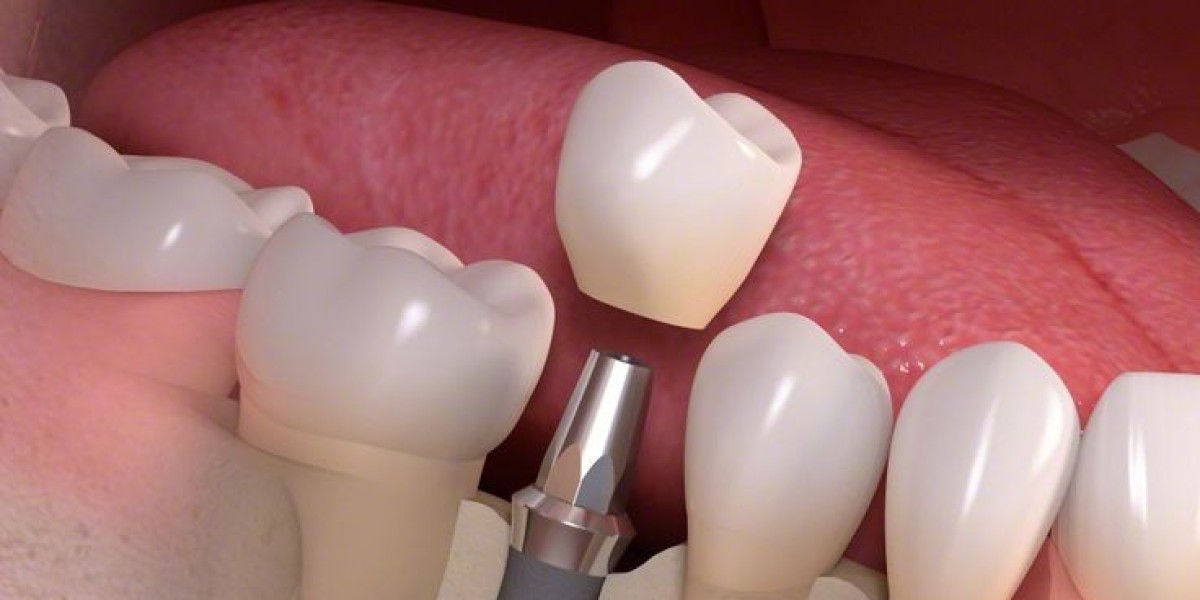What Are Dental Implants?
Dental implants are artificial tooth roots that are surgically placed into the jawbone to support replacement teeth. They are typically made of titanium, a biocompatible material that fuses with bone through a process called osseointegration. Once fused, the implant provides a stable foundation for a dental crown, bridge, or even a full set of dentures.
The primary goal of a dental implant is to mimic the function of a natural tooth root. Unlike other tooth replacement options, such as dentures or bridges, implants are anchored securely in the jaw, offering superior stability and durability. They also help preserve the integrity of the jawbone, preventing bone loss that often occurs after tooth extraction.
The Benefits of Dental Implants
Dental implants offer a variety of advantages, both in terms of function and aesthetics. Here are some of the key benefits:
Natural Look and Feel: Dental implants closely resemble natural teeth in both appearance and function. The crown placed on the implant is custom-designed to match the shape, size, and colour of the surrounding teeth, creating a seamless and natural-looking smile.
Long-Lasting Solution: With proper care, dental implants can last a lifetime. Unlike dentures, which may need to be replaced every few years, or bridges that rely on the support of neighbouring teeth, implants are designed to be a permanent solution.
Improved Oral Function: Because dental implants are firmly anchored in the jawbone, they provide excellent stability for chewing and speaking. Patients can enjoy their favourite foods without worrying about their replacement teeth shifting or slipping.
Bone Preservation: One of the most significant benefits of dental implants is that they help prevent bone loss. When a tooth is lost, the surrounding bone begins to deteriorate due to lack of stimulation. Implants stimulate the jawbone, just like natural teeth, preventing further bone resorption.
Better Oral Health: Dental implants do not require the alteration of neighbouring teeth, unlike traditional bridges, which require the adjacent teeth to be ground down for support. As a result, more of the patient’s natural teeth are preserved, contributing to better long-term oral health.
Improved Confidence: Dental implants provide a secure and natural-looking replacement for missing teeth, which can significantly boost a patient’s self-esteem. Many patients report feeling more confident in social situations and smiling freely after undergoing the implant procedure.
No Special Care Required: Caring for dental implants is straightforward and similar to caring for natural teeth. Regular brushing, flossing, and routine dental check-ups are all that is needed to maintain the health of the implants.
The Dental Implant Procedure
Getting dental implants typically involves several steps, spanning over a period of a few months. The procedure may vary depending on the number of implants needed and the condition of the patient’s jawbone, but the general process is as follows:
Initial Consultation and Examination
The first step in the dental implant process is a comprehensive evaluation by a dentist or oral surgeon. During this consultation, the dentist will examine the patient’s mouth, take X-rays or 3D scans of the jawbone, and assess whether the patient is a suitable candidate for implants.
Not all patients are immediately eligible for implants. Factors such as the health of the gums, the density of the jawbone, and overall oral hygiene play a role in determining eligibility. In some cases, patients with insufficient jawbone density may require bone grafting before the implant procedure can begin.
Bone Grafting (if necessary)
If a patient’s jawbone is not thick enough or too soft to support the implant, a bone graft may be required. Bone grafting involves placing a piece of bone or a bone substitute in the area where the implant will be placed. This creates a strong foundation for the implant by encouraging new bone growth. After the graft is completed, the patient will need to wait several months for the bone to heal before proceeding with the implant placement.
Implant Placement
Once the patient is ready for the implant placement, the oral surgeon will perform the procedure under local anaesthesia or sedation, depending on the patient’s preference. During the surgery, the dentist will make a small incision in the gum to expose the bone and create a small hole where the implant will be placed.
The titanium implant is then inserted into the bone, and the gum is stitched back into place. At this point, a healing period of three to six months is required to allow the implant to fuse with the bone in a process called osseointegration.
Abutment Placement
Once the implant has fully integrated with the bone, a second minor surgery is performed to place an abutment on top of the implant. The abutment is a small connector that holds the final crown in place. In some cases, the abutment can be placed at the same time as the implant, but more often, it is added after osseointegration has occurred.
After the abutment is placed, the gums will need to heal for a few weeks before the final restoration can be attached.
Crown Placement
The final step in the dental implant procedure is the placement of the dental crown, which serves as the visible part of the new tooth. The crown is custom-made to match the size, shape, and colour of the surrounding teeth. Once it is securely attached to the abutment, the dental implant is complete, and the patient can enjoy their new tooth with full function and a natural appearance.
Types of Dental Implants
There are several types of dental implants, depending on the needs and preferences of the patient:
Single-Tooth Implants
As the name suggests, single-tooth implants are used to replace a single missing tooth. This is the most common type of dental implant and is often used when a patient has lost a tooth due to injury or decay. The implant is placed in the location of the missing tooth, and a crown is attached to restore both function and appearance.
Multiple-Tooth Implants
For patients missing multiple teeth, multiple implants can be used to support a bridge or individual crowns. Instead of placing one implant for each missing tooth, several implants can be strategically placed to support multiple teeth, reducing the overall number of implants required.
Implant-Supported Dentures
For patients who have lost all or most of their teeth, implant-supported dentures provide a stable alternative to traditional removable dentures. Unlike conventional dentures, which rest on the gums, implant-supported dentures are anchored to the jawbone with implants, providing superior stability and preventing the slipping or shifting associated with traditional dentures.
All-on-4 Implants
All-on-4 implants are an innovative solution for patients who need a full arch of teeth replaced. This method uses just four strategically placed implants to support an entire arch of prosthetic teeth. It is often faster and less invasive than placing individual implants for each tooth, and it offers a strong, durable result.
Cost of Dental Implants
The cost of dental implants can vary significantly depending on several factors, including the number of implants needed, the complexity of the procedure, and the location of the dental practice. On average, the cost of a single dental implant in the UK ranges from £1,500 to £3,500. Here are some of the factors that influence the overall cost:
Number of Implants: The more implants required, the higher the overall cost. For patients who need multiple teeth replaced, the cost can quickly add up.
Preliminary Procedures: If bone grafting, sinus lifts, or extractions are required before the implant can be placed, these procedures will add to the overall cost.
Type of Implant: Different types of implants may have different price points, particularly if the patient opts for a premium implant brand or advanced technology like All-on-4.
Dental Clinic Location: Dental implant costs can vary depending on the location of the practice. Clinics in major cities like London may charge higher fees compared to those in smaller towns or rural areas.
Materials Used: The cost of the crown, abutment, and implant can vary depending on the materials used. For example, porcelain crowns are typically more expensive than metal crowns.
Expertise of the Surgeon: The experience and qualifications of the dental surgeon can also affect the cost. Highly skilled and experienced surgeons may charge more for their services.
Is the Cost of Dental Implants Worth It?
While dental implants can be more expensive than other tooth replacement options, such as dentures or bridges, they offer significant long-term benefits that can make them worth the investment. Implants provide a permanent solution that looks, feels, and functions like natural teeth. They also help preserve the health of the jawbone and surrounding teeth, which can prevent future dental issues and reduce the need for additional treatments.
Additionally, dental implants have a high success rate and are considered one of the most durable and reliable options for tooth replacement. For many patients, the cost of dental implants is outweighed by the improved quality of life, enhanced oral health, and increased confidence that they provide.
Conclusion
Dental implants have revolutionised the field of restorative dentistry, offering patients a durable and aesthetically pleasing solution for missing teeth. Whether you're missing a single tooth or need a full arch of teeth replaced, implants can provide a natural-looking, long-lasting result. While the cost of dental implants may be higher than other options, their durability, functionality, and numerous benefits make them a worthwhile investment in your long-term oral health and wellbeing.
If you're considering dental implants, it's essential to consult with a qualified dental professional to discuss your options and determine the best treatment plan for your needs. With proper care, dental implants can restore your smile and improve your quality of life for many years to come.



